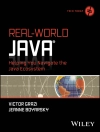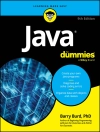Take advantage of the growing trend in functional
programming.
C# is the number-one language used by .NET developers and one of
the most popular programming languages in the world. It has many
built-in functional programming features, but most are complex and
little understood. With the shift to functional programming
increasing at a rapid pace, you need to know how to leverage your
existing skills to take advantage of this trend.
Functional Programming in C# leads you along a path that
begins with the historic value of functional ideas. Inside, C# MVP
and functional programming expert Oliver Sturm explains the details
of relevant language features in C# and describes theory and
practice of using functional techniques in C#, including currying,
partial application, composition, memoization, and monads. Next, he
provides practical and versatile examples, which combine approaches
to solve problems in several different areas, including complex
scenarios like concurrency and high-performance calculation
frameworks as well as simpler use cases like Web Services and
business logic implementation.
* Shows how C# developers can leverage their existing skills to
take advantage of functional programming
* Uses very little math theory and instead focuses on providing
solutions to real development problems with functional programming
methods, unlike traditional functional programming titles
* Includes examples ranging from simple cases to more complex
scenarios
Let Functional Programming in C# show you how to get in
front of the shift toward functional programming.
Table des matières
INTRODUCTION.
PART I: INTRODUCTION TO FUNCTIONAL PROGRAMMING.
CHAPTER 1: A LOOK AT FUNCTIONAL PROGRAMMING HISTORY.
CHAPTER 2: PUTTING FUNCTIONAL PROGRAMMING INTO A MODERN
CONTEXT.
PART II: C# FOUNDATIONS OF FUNCTIONAL PROGRAMMING.
CHAPTER 3: FUNCTIONS, DELEGATES, AND LAMBDA EXPRESSIONS.
CHAPTER 4: FLEXIBLE TYPING WITH GENERICS.
CHAPTER 5: LAZY LISTING WITH ITERATORS.
CHAPTER 6: ENCAPSULATING DATA IN CLOSURES.
CHAPTER 7: CODE IS DATA.
PART III: IMPLEMENTING WELL-KNOWN FUNCTIONAL TECHNIQUES IN
C#.
CHAPTER 8: CURRYING AND PARTIAL APPLICATION.
CHAPTER 9: LAZY EVALUATION.
CHAPTER 10: CACHING TECHNIQUES.
CHAPTER 11: CALLING YOURSELF.
CHAPTER 12: STANDARD HIGHER ORDER FUNCTIONS.
CHAPTER 13: SEQUENCES.
CHAPTER 14: CONSTRUCTING FUNCTIONS FROM FUNCTIONS.
CHAPTER 15: OPTIONAL VALUES.
CHAPTER 16: KEEPING DATA FROM CHANGING.
CHAPTER 17: MONADS.
PART IV: PUTTING FUNCTIONAL PROGRAMMING INTO ACTION.
CHAPTER 18: INTEGRATING FUNCTIONAL PROGRAMMING APPROACHES.
CHAPTER 19: THE MAPREDUCE PATTERN.
CHAPTER 20: APPLIED FUNCTIONAL MODULARIZATION.
CHAPTER 21: EXISTING PROJECTS USING FUNCTIONAL TECHNIQUES.
INDEX.
A propos de l’auteur
Oliver Sturm has over 20 years experience developing professional software. He is a well-known expert in various areas of application architecture, programming languages and the third-party .NET tools made by Dev Express. His main focus since 2002 has been on the .NET platform.












